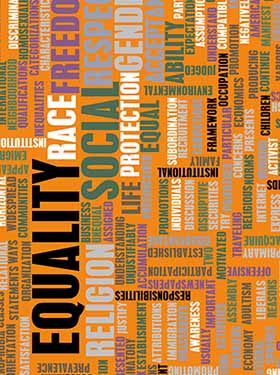This is the second of a series of blogs at OCCRL that reflect on issues of equity relative to the current societal racial climate and how higher education institutions are a microcosm of today’s racially tense times.
Like many of you reading this, on any given day names, faces, hashtags, and often highly uncivil discourse about the value of Black Lives and Brown Lives flood the screen in front of me. This is the same screen where I am compiling data or writing briefs on improving campus environments for what could have been the same young, unarmed Black or Latinx individual whose life is being recapped and parsed by pundits on CNN. I know their names: Philandro Castile, Alton Sterling, Anthony Nuñez, Sandra Bland, Trayvon Martin, and so many others. I know a very small something of their stories. But I have begun to ask myself--do I know how the societal inequities and racism that led to their deaths bear on the work that I do to improve the quality and equity of the opportunities provided by higher education? Moreover, have I begun to grasp how I can follow the lead of activists and leaders who are instructing a generation about how to understand and apply intersectionality and stand against systemic “isms” like Patrisse Cullors, Opal Tometi, and Alicia Garza, founders of Black Lives Matter?
My job, happily, is to think, learn, research, and get to know educators in an effort to figure out something both simple and incredibly complex—how can we help more students succeed in higher education? Unpacking that question inevitably leads to deeper discussions on issues of systems change, public policy, and perhaps most critically to analysis of how inequalities based in race and class are either reproduced or disrupted because of our educational structures. This work is rooted not just in my professional identity, but also in my heart, my family, and my own experiences navigating community colleges and higher education, generally.
I have realized this spring and summer that I need to be careful not to become too narrowly focused. I learn from my colleagues, from other academics and researchers, from community college educators. I frame the world, sometimes, in terms of the questions these wonderful colleagues and leaders are asking and the solutions they are testing to improve campuses and student experiences. However we in higher education are certainly not the only ones talking about issues of race, disparity, and inequality in higher education. What’s more, sometimes the violence and bias people of color are facing in our country in a broader context make the issues of inequitable outcomes in community colleges feel less urgent in comparison, and often the leaders of movements outside of higher education have a great deal to teach us about transforming systems to challenge inequity.
I have yet to find a balance between striving to work within our current systems to improve educational equity on one hand, and actively engaging as an ally to Black Lives Matter on the other hand. The belief that all lives matter, without acknowledgement that people of color have been systemically treated as if their lives do not is a case in point for why the Black Lives Movement emerged. However, I am finding that this question is resonating with my colleagues—how are you continuing to work in higher education and learn from our broader social context about the unconscionable effects of not mattering? What does it mean to you and your students to show up to the office or to class after another life is lost? How are you handling the tough conversations?
